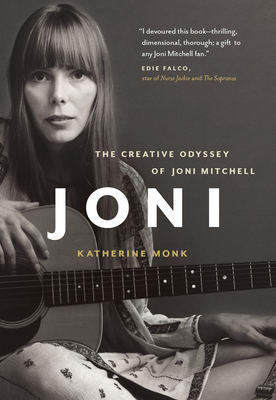From the moment Joni Mitchell's career
began — with coffee-house bookings, serendipitous encounters with
established stars, and a recording contract that gave her full creative
control over her music — the woman from the Canadian wheat fields has
eluded industry cliches. When her peers were focused on feminism,
Mitchell was plumbing the depths of her own human condition. When arena
rock was king, she turned to jazz. When all others hailed Bob Dylan as a
musical messiah, Mitchell saw a fraud burdened with halitosis. Unafraid
to "write in her own blood," regardless of the cost, Mitchell has been
vilified as a diva and embraced as a genius, but rarely has she been
recognized as an artist and a thinker.
This new portrait of the reclusive icon examines how significant life events — failed relationships, the surrender of her infant daughter, debilitating sickness — have influenced her creative expression. Author Katherine Monk captures the rich legacy of her multifaceted subject in this offbeat account, weaving in personal reflections and astute cultural observations, and revealing the Mitchell who remains misunderstood.
Hank says:
This new portrait of the reclusive icon examines how significant life events — failed relationships, the surrender of her infant daughter, debilitating sickness — have influenced her creative expression. Author Katherine Monk captures the rich legacy of her multifaceted subject in this offbeat account, weaving in personal reflections and astute cultural observations, and revealing the Mitchell who remains misunderstood.
Hank says:
"Rather than approaching her subject through chronological
biography, Katherine Monk addresses groupings of topics, relating them
to the life and career of Joni Mitchell, jumping backward and forward
through time. There's certainly some discussion of her music, but much
of the writing deals more with various philosophical and sociological
influences on artistic creativity. The anecdotal content revisited some
stories I knew about Mitchell, reminded me of ones I'd forgotten, and
revealed ones I hadn't heard. I was especially interested to learn that
her song 'Man from Mars' was not, after all, a lament for yet another
relationship with a man that didn't last, but rather her way of working
through the guilt and sorrow of one of her cats going missing! Knowing
that, I now see that there are lyrical indications, but it never crossed
my mind. Happy ending: He turned back up not long after she finished
composing the song.
Since Monk accepted Mitchell's unwillingness to give
interviews, the source material is all secondary, and abundantly
footnoted. With a few exceptions, I bleeped over most of the
attributions, and didn't feel like I was missing much, in a fairly quick
read. I'd recommend it both to fans of Mitchell's music and to people
who casually want to know a little more about that 'Both Sides Now'
lady."


No comments:
Post a Comment